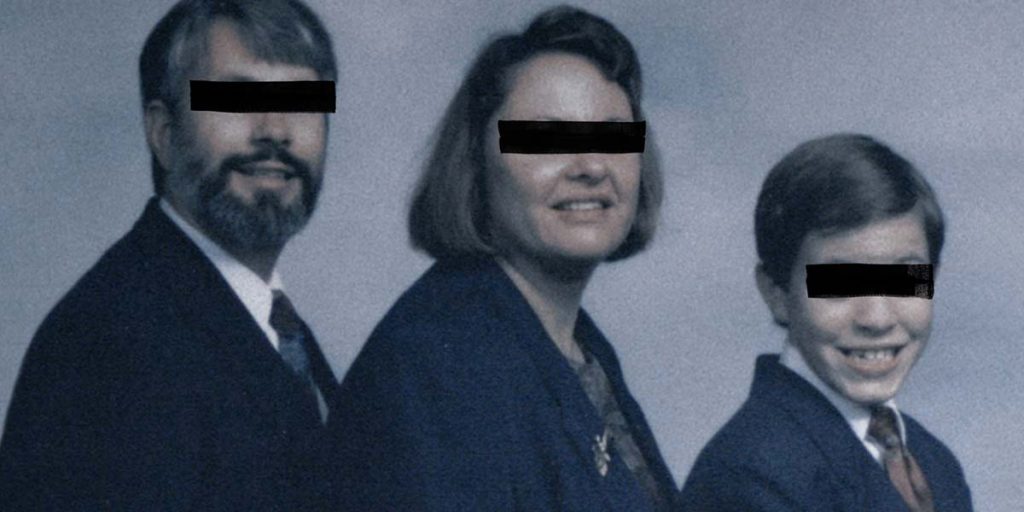Enemies of the State tells a fascinating story, although it suffers from some issues outside of the filmmaker’s control.
As the title of this review alludes, Enemies of the State presents its mission statement in its opening seconds with an Oscar Wilde quote: “the truth is rarely pure and never simple.” It’s a relevant quote considering the entire film consists of two sides presenting their perspective of a situation, and the audience is left to decide for themselves which of them is telling the truth, or more of it. This documentary, however, does not seem shy about nudging you in the direction of the arguments with which director Sonia Kennebeck wants you to side, that is, until some curveballs are thrown in at the last minute.
Enemies of the State is a documentary focusing on Matt DeHart, a once-member of the internet hacker group Anonymous, and his family. According to DeHart, in 2009 he found an unencrypted folder containing hundreds of documents detailing harmful and illegal activities carried out by the United States government. Shortly after these alleged findings, state government officials raided his house and found child pornography. The DeHart family allege that the seizures were orchestrated by the government to cover up the information leaked to Matt, while lawyers involved in the case claim Matt made up the unencrypted folder to cover up his possession of child pornography.
Enemies of the State takes the time to gather as many voices as it can; the film’s initial focus may be on the DeHart family, but Kennebeck also enlists multiple perspectives ranging from old family friends providing character references, to Canadian officials from when the DeHarts fled the United States, the journalists and experts closely following the story, to prosecutors working the opposite side of Matt’s child pornography case. With so many different voices, the film lives up to its thesis: the truth is bound to be in there somewhere, but with so many different viewpoints it certainly isn’t “simple.”
There are two voices, however, that are missing from the film that would have been invaluable in crafting the narrative: Matt DeHart and any sort of representative from the FBI. Apparently, the FBI declined to make any comments, and DeHart agreed to an interview but did not show up the day it was supposed to happen. Though the film isn’t at fault, Enemies of the State would have benefited greatly from hearing directly from the two central players of the conflict.
Having at least one of those would have gone a long way towards giving Enemies of the State a clearer direction. The story it tells is a fascinating one; one where Matt alleges FBI torture, and the entire DeHart family ends up fleeing to Canada, all countered with damming evidence of Matt’s inappropriate online behavior with minors. As it is, Enemies of the State seems to be trying to give equal weight to each side; it’s more sympathetic to the DeHarts in the first half before piling on the dissenting voices later on before dropping a bombshell near the end. I get that this “both sides” approach supports the thesis of truth not being simple, but because the film chooses not to take a side, you lose that narrative angle which may be important for the immersion of some viewers.
Another aspect of the film that may prove polarizing to viewers is its dramaticized recreations of events. Now, a documentary portraying events with actors is not an inherently bad thing: two docuseries that do this very well are Roman Empire and Hitler’s Circle of Evil. Enemies of the State’s dramatizations are different from the aforementioned two, however, because it makes use of actual audio recordings of the people being portrayed. In several of these scenes, actors will lip sync to the real recorded dialogue, which honestly feels a little jarring. Several of these people are interviewed elsewhere in the film, and it feels weird to hear their voices coming out of another person’s mouth. Not to mention the rare occasions when an actor’s lips don’t quite line up to the recording. Because these chunks of recorded dialogue are so long, however, I would say that this method is more interesting than having minutes of words laid out on the screen for you to read. Still, it feels a bit “uncanny valley,” you know?
Enemies of the State had a difficult task ahead of itself: take an ambiguous story revolving around issues of national security and child abuse, and find some sort of truth buried within while being sensitive to the topics at hand. While I do think taking a side would have made for a more engaging story, I understand why Sonia Kennebeck elected not to: without a concrete truth, taking a side without knowing all of the facts would risk building false narratives. But because of this, Enemies of the State also feels like Kennebeck doesn’t take a stance on anything. It may present people who feel strongly about Matt DeHart one way or another, but stops shy of doing anything big or groundbreaking.

